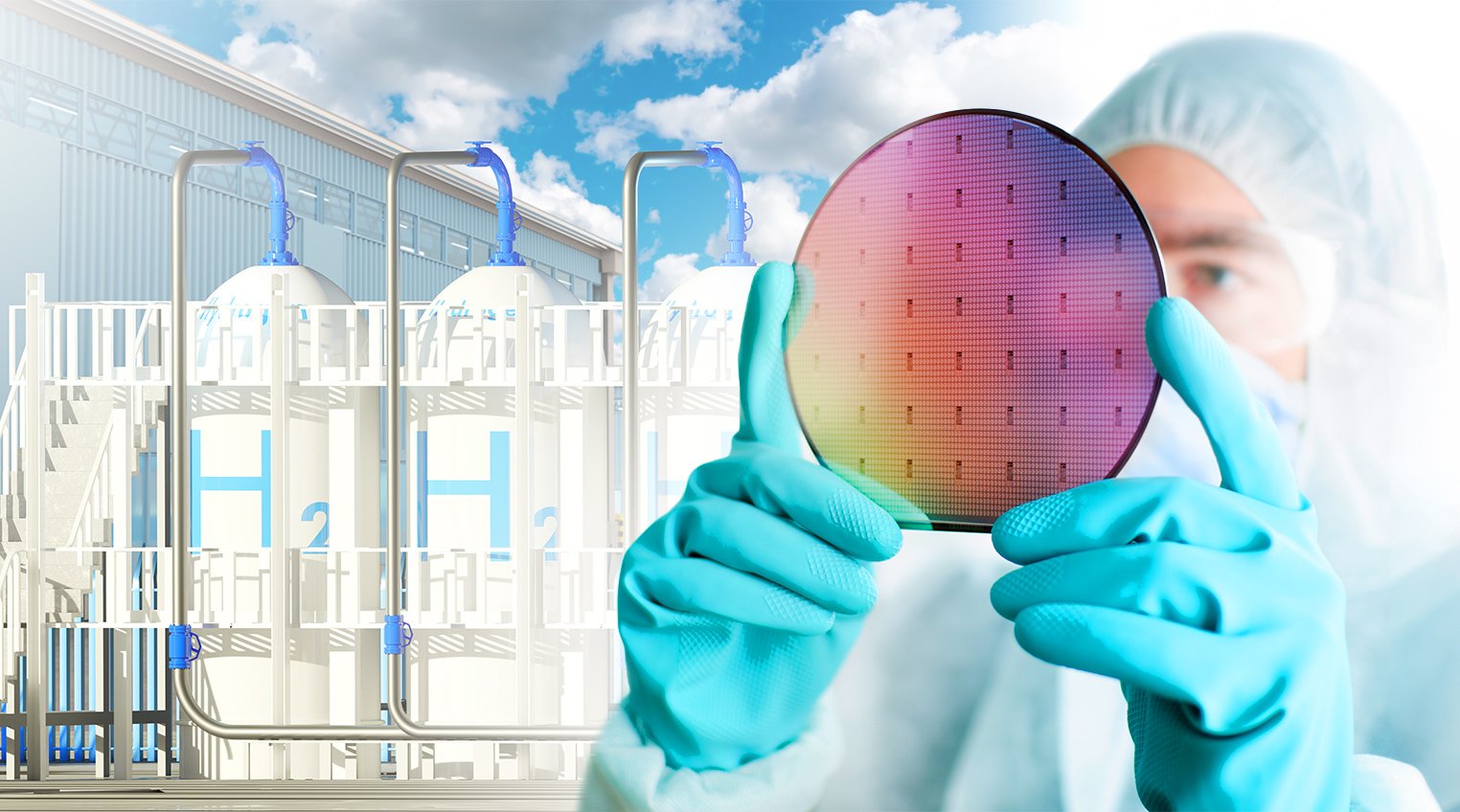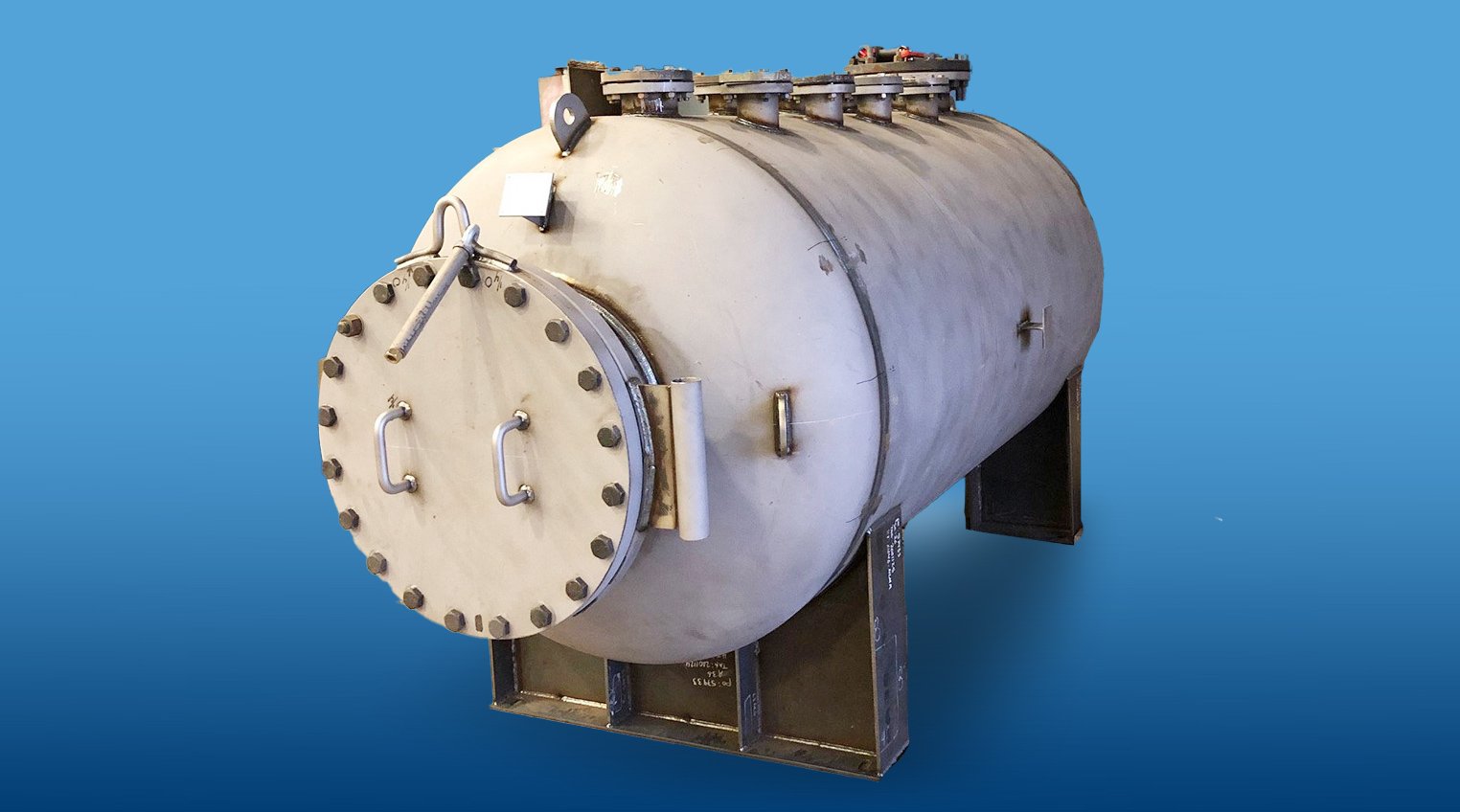Types of Plastics Used in the Semiconductor Industry
A standard semiconductor fab requires a substantial volume of fluids to support manufacturing operations. In terms of ultrapure water alone, one large semiconductor fab might require 4.8 million gallons per day, which is equivalent to the needs of 60,000 city residents.1 It is critical to preserve and utilize these fluids wisely, thereby maximizing containment.
It takes a high-purity plastic to match the containment requirements of a high-purity process. Fluoropolymers are among the best materials available to maximize containment, and rotational molding is one of the best processes for creating the vessels, bottles, tanks, and containers required.
Consequences of improper fluid containment
The fluids required for wafer processing can include chemicals used for cleaning, etching, deposition, and planarization processes as well as solvents, rinsing agents, and other materials used on wet benches and other areas. In addition, purified water and other specialized fluids rinse and purge equipment to maintain cleanliness and purity standards and to prevent contamination.
Fluid containment plans require materials that meet the requirements of a range of liquids— from ultrapure water to aggressive chemicals. The consequences of using the wrong material or container can be dire, leading to product defects, wasted product, or compromised worker safety.
Rotational molding relies on fluoropolymer resins to fabricate tanks, vessels, and bottles. The combination of the fluoropolymer resin and rotational molding technology supplies containment for fluids throughout the semiconductor fab and processes. Fluoropolymers as a class offer:
- Chemical resistance
- A smooth, nonporous surface
- Temperature resistance
- Low friction
- Electrical properties
- Low surface energy
- Inertness
- Durability/flexibility
In addition, many fluoropolymer resins are an economical choice for fluid containment in high-purity applications. The process results in robust solutions that resist breakage or cracking, shattering, and leaching. These high-purity plastics can act as electrical insulators and provide chemical resistance, supplying the versatility and reliability needed to meet diverse requirements in a highly controlled semiconductor production environment.

Understanding rotational molding
Rotational molding is a fabrication technology that produces containers — such as vessels, tanks, or bottles — that have no interior seams. Unlike other molding techniques, such as blow molding or injection molding, rotational molding creates products with a smooth interior surface. This minimizes the risk of sedimentation or bacterial buildup and assists with 100% fluid recovery.
In the rotational molding process, RMB Products technicians melt polymer resin and heat and rotate the mold biaxially to evenly distribute the resin on the interior surface of the mold. The process and materials result in durable containers that can withstand harsh chemicals and repeated handling.
![]()
Other traditional materials, such as glass or even metal, can shatter or compromise content purity. Rotational molding presents semiconductor fabs with reliable solutions for fluid containment, offering the mechanical characteristics and chemical resistance required for a successful operation.
RMB can also leverage rotational molding technology to create recessed fittings or different geometries. These steps can accommodate customer specifications for cabling, mounting devices, level sensors, or other peripherals.
Which plastic is best to use in the semiconductor industry? Here are five high-purity plastics typically used in rotational molding for semiconductor applications:
Perfluoroalkoxy (PFA)
- Characteristics: PFA resins exhibit high chemical inertness, low surface energy, and excellent dielectric properties, making PFA containers highly suitable for a variety of semiconductor processes.
- Properties: PFA offers superior resistance to acids, bases, and organic solvents, to maintain contained fluid purity. PFA has low permeability, to prevent the passage of gases and liquids. The smooth surface of a PFA container facilitates easy cleaning and thorough fluid recovery. This fluoropolymer also has an extremely high processing temperature, offering stability in applications that experience temperatures greater than 400° F while maintaining its chemical compatibility. Many manufacturers find it challenging to work with PFA, which is difficult to mold due to its unforgiving mechanical properties. RMB utilizes a proprietary process to mold containers successfully with PFA.

- Benefits: The seamless, weld-free interior of a PFA-rotomolded container eliminates potential contamination points. PFA’s durability, abrasion resistance, and ability to withstand impact contribute to an extended service life and reduced maintenance and replacement requirements.
- Applications: PFA containers are commonly used in wafer cleaning, etching, and chemical mixing processes within semiconductor fabrication facilities.
Among the resins listed, PFA would be most suitable to contain ultrapure water, because PFA is known for its low extractables, meaning it releases minimal substances into contained fluids over time. This property is critical for ultrapure water containment, as even trace amounts of contaminants can compromise product quality.
Ethylene tetrafluoroethylene (ETFE)
- Characteristics: ETFE resins create parts known for exceptional mechanical properties, including high tensile strength and impact resistance. This resin also exhibits excellent chemical resistance to a wide range of corrosive substances.
- Properties: ETFE’s high thermal stability allows it to withstand elevated temperatures without degrading, making this resin suitable for applications involving thermal processing or heat exposure.
- Benefits: Rotomolded ETFE containers provide reliable containment for aggressive chemicals used in semiconductor manufacturing, minimizing the risk of contamination and contributing to process integrity.
- Applications: ETFE vessels are commonly used in chemical baths, etching processes, and fluid containment applications, where high mechanical strength and chemical resistance are required.
Polypropylene
- Characteristics: Polypropylene exhibits good chemical resistance to acids, bases, and organic solvents, making it suitable for use within a wide range of semiconductor manufacturing stages. This resin is also lightweight and easy to mold.
- Properties: Rotomolded polypropylene containers offer flexibility and ductility for greater durability and impact resistance, enabling them to withstand continued use in demanding environments.
- Benefits: Polypropylene containers offer a winning combination of performance, availability, and affordability, making this resin a popular choice for semiconductor fluid containment applications. The versatility of this resin enables manufacturers to make bottles with threaded caps or incorporate special grooves to accommodate sensor systems and fluid measurement devices.
- Applications: Polypropylene bottles and tanks find use in chemical mixing, fluid measurement, and storage applications within semiconductor fabrication facilities, where cost-effectiveness blends with performance.
Polyvinylidene fluoride (PVDF)
- Characteristics: PVDF exhibits high chemical inertness and thermal stability, enabling it to withstand the aggressive chemicals and elevated temperatures found in semiconductor processes.
- Properties: PVDF-rotomolded containers provide a seamless, nonreactive surface that prevents contamination and maintains the purity of contained fluids. PVDF has low permeability and high surface energy, which facilitate thorough fluid recovery and transfer and easy cleaning.
- Benefits: PVDF containers offer reliability and durability under harsh conditions, supporting a long service lifespan. Their low permeability and high surface energy minimize the risk of chemical leaching and contamination. This resin results in containers better able to resist abrasion and endure impact.
- Applications: PVDF vessels can find use in chemical baths, etching processes, and fluid containment applications, where high chemical resistance and thermal stability are essential to maintaining process integrity.
High-density polyethylene (HDPE)
- Characteristics: HDPE exhibits good chemical resistance to various acids, bases, and organic solvents, making it suitable for many semiconductor applications.
- Properties: In addition to chemical resistance, HDPE-rotomolded containers are lightweight and impact resistant, making them easy to handle and transport. HDPE vessels also exhibit low moisture absorption, which minimizes the risk of microbial growth by reducing the amount of available water necessary for microorganisms to survive and proliferate.
- Benefits: HDPE containers balance performance with affordability, providing reliable fluid containment while minimizing costs.
- Applications: HDPE bottles and tanks find use in various semiconductor processes, including chemical storage, mixing, and distribution.
By leveraging technologies like rotational molding and selecting high-performance resins, such as PFA, ETFE, polypropylene, PVDF, or HDPE, semiconductor fabs can maintain the integrity of ultrapure water and other fluids, safeguard employees working with hazardous substances, and minimize the risk of contamination that might ruin products and processes.
RMB sources its resins exclusively from reliable manufacturers, including Dow, Chemours, and 3M. Customers can request the material certifications and the traceability chain for any resins utilized in RMB’s rotational molding process.
These materials offer a combination of chemical resistance, thermal stability, and mechanical strength, enabling semiconductor manufacturers to meet their production goals while upholding the strictest purity standards. Request a quote for a cost-effective, high-performance containment vessel for your semiconductor application.



